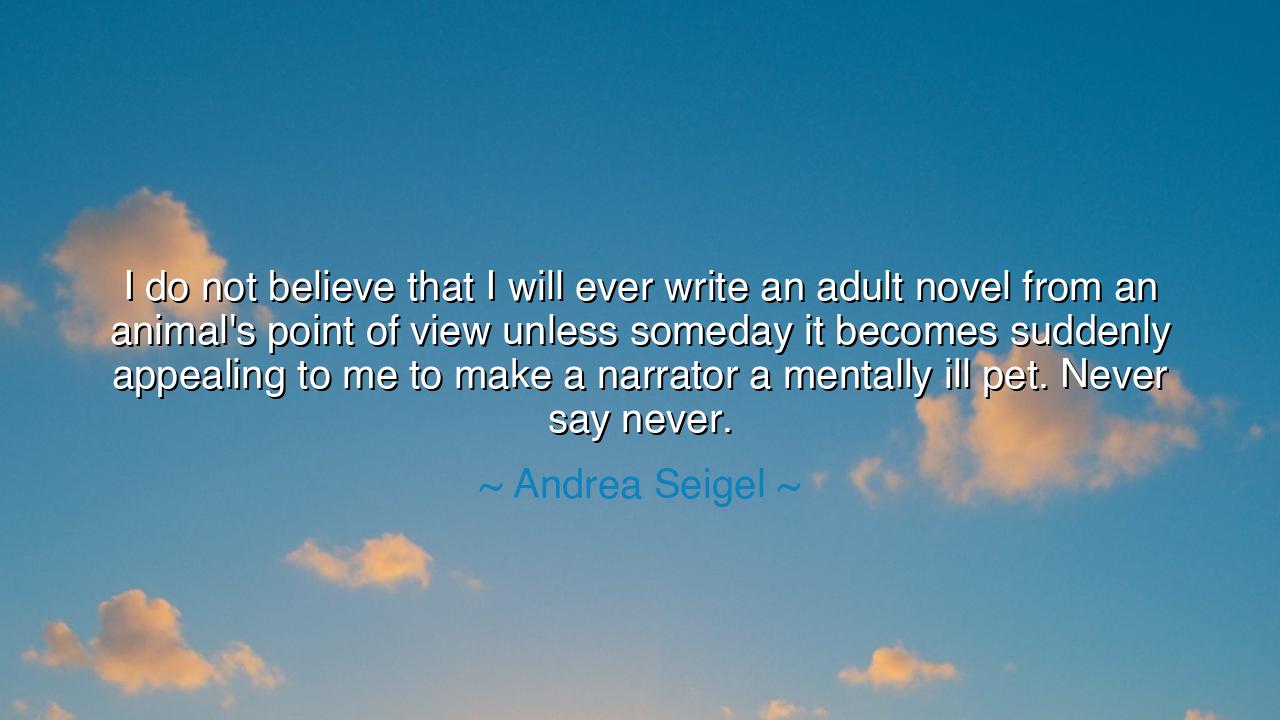
I do not believe that I will ever write an adult novel from an
I do not believe that I will ever write an adult novel from an animal's point of view unless someday it becomes suddenly appealing to me to make a narrator a mentally ill pet. Never say never.






In the words of Andrea Seigel: “I do not believe that I will ever write an adult novel from an animal's point of view unless someday it becomes suddenly appealing to me to make a narrator a mentally ill pet. Never say never.” At first, this statement seems playful, even tinged with humor. Yet beneath its lightness lies a truth that echoes across the ages: the human spirit must not close itself off to possibility. Seigel speaks not only of her own craft as a writer, but of the larger principle that governs all lives—the wisdom of uncertainty, the humility of saying, “Never say never.”
For to live is to walk in mystery. We believe we know what we will or will not do, but the river of life bends in ways unseen. Who among the ancients would have thought that a shepherd boy named David would stand against Goliath and win? Who among the scholars of Athens would have imagined that Socrates, condemned to death, would become immortal through his questions? They too might have said “never,” yet fate had other plans. Thus Seigel’s words remind us that possibility always lingers, even in the most unlikely forms—whether in writing, in love, in struggle, or in triumph.
The image of a mentally ill pet as narrator is strange, even unsettling, yet it serves as a symbol of the unexpected. Life often presents us with perspectives that feel absurd, unthinkable, or unwanted, but from them comes revelation. The prophet Balaam in the Hebrew scriptures once found wisdom spoken not from the lips of men but from the mouth of his donkey. In that moment, the lowly creature became the bearer of divine truth. So too Seigel suggests that even what seems strange or undesirable may one day carry meaning, if only we remain open to the possibility.
Her words also reflect the nature of the artist’s heart. To write is not to command inspiration, but to follow it. The artist who says “never” closes the door to imagination; the artist who says “never say never” leaves a window open for the winds of creation. Many of the world’s greatest works were born of accidents or sudden inspirations. Cervantes did not set out to create the modern novel in Don Quixote—he wrote a satire, yet it grew beyond him into something eternal. Leonardo da Vinci sketched flying machines centuries before airplanes, not because he swore he would, but because curiosity carried him. So too Seigel knows that to be true to her art, she must honor the unforeseen.
The deeper meaning of this quote, then, is not about animals or novels at all—it is about openness. Life calls us not to rigid certainties but to readiness, to the courage to embrace what comes even if it startles or confuses us. To declare absolutes is to challenge destiny, and destiny delights in humbling us. The wise soul learns to laugh with fate, to say: “Though I do not expect it, though I may resist it, still—I will not deny that tomorrow may surprise me.”
The lesson for us is clear: hold your convictions, but hold them lightly. Do not bind your future with chains of “never,” for in doing so, you may blind yourself to doors that open. Instead, be firm in your values but flexible in your actions. Allow yourself to be surprised. If opportunity or inspiration comes from a place you did not expect—from a conversation, a chance encounter, even from the smallest voice—do not dismiss it too quickly. The absurd may carry wisdom, and the impossible may become the inevitable.
In practice, cultivate a spirit of openness. When you feel yourself declaring “I will never do this,” pause and remember Seigel’s words: never say never. Try what you once resisted. Listen to the story you once dismissed. Walk the path you once thought foolish. For life is not a straight road but a labyrinth, and those who walk with openness will find treasures in its hidden turns.
Thus Andrea Seigel’s statement, though spoken in jest, becomes a teaching of the ancients: the future is unwritten, and the soul must remain awake. Do not close yourself off with certainty, but live with the humility of surprise. For in the end, the greatest wisdom is not to know what will be, but to remain ready for what may come.






AAdministratorAdministrator
Welcome, honored guests. Please leave a comment, we will respond soon